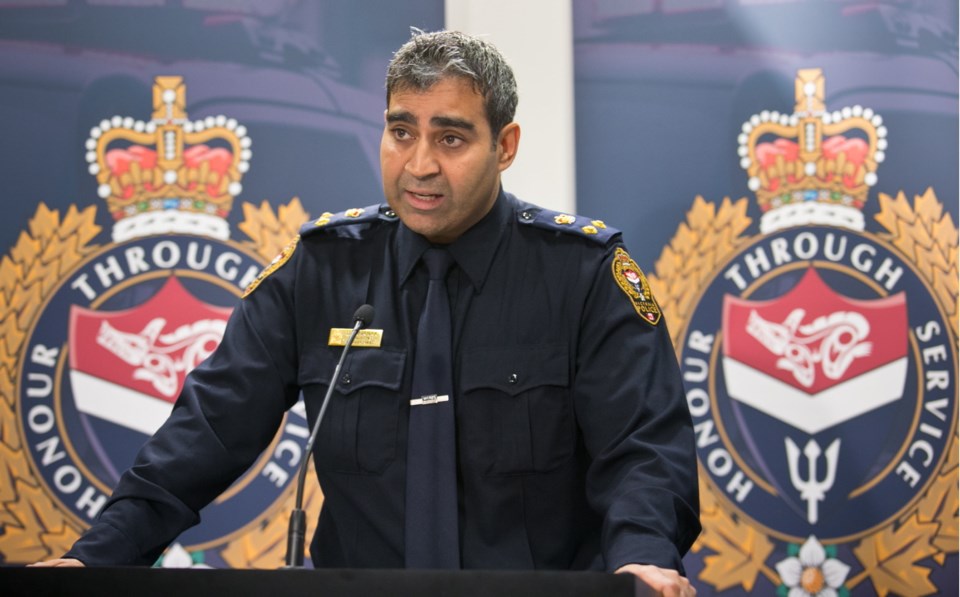The Victoria Police Department is cutting its school liaison officer program after it did not get the six new officers it asked for.
After Esquimalt council turned down the request for new officers in March, Chief Del Manak warned that the department would be forced to cut service in “non-critical areas” in order to deploy more officers to the front lines.
On Wednesday he announced that all three school liaison officers, one intelligence officer, one reserve constable and one community services officer would be redeployed to patrol and a new alternative response unit that will handle calls over the phone.
“I have no choice,” said Manak, a former school liaison officer.
“I have to prioritize. Do I not follow high-risk sex offenders or monitor high-risk offenders?
“What about the illicit overdoses that are happening in our community?
“Whichever way I look, there are no good options here.”
Esquimalt Mayor Barb Desjardins slammed the move, saying the liaison officers are the first line of defence in preventing students from falling into criminal behaviour and are particularly crucial during the overdose crisis.
“We’re extremely concerned about it. We value our school resource officers, we value our community policing approach,” Desjardins told the Times Colonist.
“This is taking away the preventative measure that reduces your load in other ways.”
Desjardins said she has already received emails from concerned parents.
Peter Kasianchuk, a member of Esquimat High’s parents advisory council, said parents feel “completely blindsided” by the news.
“We’re exceedingly dismayed,” he said. “The value of the school liaison officers can’t be overstated.”
The school liaison officer was particularly critical when the school was on lockdown in November due to a robbery in the area, Kasianchuk said.
Kasianchuk said it’s “tone deaf” for Manak to mention the overdose crisis as a justification for the redeployment, pointing to the overdose death of 16-year-old Oak Bay High student Elliot Eurchuk as evidence this issue is affecting students.
“He’s playing politics with our kids’ lives,” Kasianchuk said.
School liaison officers maintain a presence in a school, attend school and community events and are the main point of contact between Victoria police, students, teachers and parents.
Manak agreed that “school liaison officers are critical” and acknowledged that teachers rely heavily on those officers in dealing with at-risk students. Teachers often turn to liaison officers when a student is exhibiting worrying behaviour that might not be criminal but is above the capacity of a counsellor or teacher, Manak said.
“The police are in there to be able to guide and help and mentor and to bridge the gap and provide support. Unfortunately, that support will no longer be there,” he said.
Victoria Mayor Lisa Helps said Manak had to make a tough decision to ensure that officers can quickly respond to emergency calls.
Helps said the school-liaison program “is a very valuable program, without question. But I think that the whole public should be concerned if they call 911 and it takes police a long time to get there because they’re six officers short on the front lines.
“It’s a very difficult position for the chief to be in.”
Desjardins said school liaison officers and community resource officers were a key part of the 10-year framework agreement reached between Esquimalt, Victoria and the police department in 2014.
The agreement ensured the Township of Esquimalt received dedicated officers and laid out a funding formula after Esquimalt threatened to contract out to the RCMP instead.
In March, Esquimalt council voted 4-3 against spending $40,778 to fund its share of hiring six additional officers. Esquimalt is responsible for about 15 per cent of the police budget, while Victoria covers the balance.
Several councillors were confused as to why the department needed new officers when quarterly police statistics have regularly shown reductions in calls and crime rates. Manak responded that disclosure requirements have made investigations more time consuming.
In January, the City of Victoria voted in favour of a $528,000 increase to the Victoria-Esquimalt police budget to fund the new officers.
Victoria coun. Ben Isitt, who voted against any staffing increase, said the move to cut the school resource officers is a political one. “I hope the chief reconsiders his decision and maintains those positions and retreats from this political power play.”
The province has been asked to step in and solve the dispute over the six officers, which is the process under the Police Act when two municipalities disagree on funding matters. The province has the power to overrule Esquimalt council’s decision and force the municipality to pay for the new officers.
VicPD, which has about 240 sworn officers, hasn’t had an increase in its ranks since 2010.



